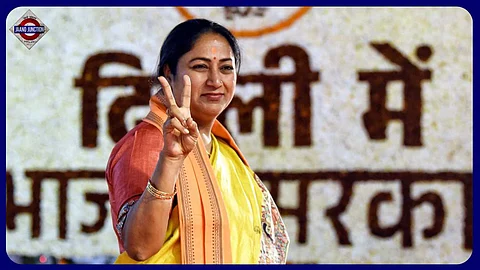

In a stunning political development, Rekha Gupta has been sworn in as the new Chief Minister of Delhi, marking a significant milestone in BJP’s governance strategy for the national capital. Her appointment follows BJP’s landslide victory in the Delhi Assembly elections, unseating the Aam Aadmi Party (AAP) after years of dominance.
Gupta’s rise to the top is a classic story of grassroots leadership, making her the fourth woman CM of Delhi, after Sushma Swaraj, Sheila Dikshit, and Atishi. But who is Rekha Gupta, and what makes her the BJP’s choice to lead Delhi?
Born and raised in Delhi, Rekha Gupta is a seasoned politician with decades of experience in student activism, municipal governance, and party organization. She began her political journey in the 1990s as a member of the Akhil Bharatiya Vidyarthi Parishad (ABVP), the student wing of the Rashtriya Swayamsevak Sangh (RSS). Her leadership skills were evident early on when she became the President of the Delhi University Students’ Union (DUSU).
Gupta later transitioned into mainstream politics, contesting and winning municipal elections twice (2007 and 2012) from Uttar Pitampura (Ward 54). She served as a councillor and later as the Mayor of South Delhi, where she focused on infrastructure development, sanitation, and women’s safety initiatives.
Her steady political climb saw her hold key positions within the BJP, including:
✅ Secretary of Bharatiya Janata Yuva Morcha (BJYM) Delhi unit
✅ General Secretary of Delhi BJP Mahila Morcha
✅ Member of BJP’s National Executive
At 50, Rekha Gupta is now a first-time MLA and the Chief Minister of Delhi, proving that BJP’s leadership is willing to bet on fresh yet experienced faces to lead the national capital.
Gupta’s appointment is seen as a strategic move by BJP to bring in a leader with strong organizational ties and an understanding of civic governance. She is also viewed as a disciplined RSS-backed leader, aligning with BJP’s ideological framework.
Sources suggest that the BJP top brass has high expectations, with the Centre expecting "visible results" within the first 100 days of her tenure. With a background in urban governance and local administration, Gupta is expected to prioritize infrastructure development, women’s safety, and civic management reforms.
Stepping into the role previously held by stalwarts like Sheila Dikshit and Sushma Swaraj, Rekha Gupta faces an uphill battle. The capital’s water crisis, pollution levels, traffic congestion, and education sector require urgent attention. Additionally, BJP will be under pressure to deliver on its electoral promises and prove its governance capabilities in Delhi.
As Delhi watches closely, all eyes are on Rekha Gupta to see whether she can emerge as the strong, results-driven leader that BJP envisions or if the challenges of governing the national capital will prove to be too formidable.
